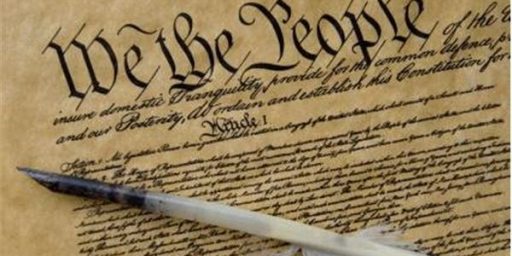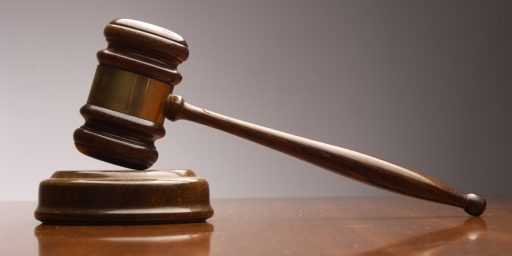Jury Nullification, Voir Dire, and Honorable Lying
Julian Sanchez had the chance to put his ethics to the test Wednesday. He was in the jury pool for a non-violent drug case and got this question in the voir dire process:
Number Nine: Do you have strong feelings about drugs or drug dealing that might prevent you from objectively applying the law to the facts of the case? [She pauses, and then, as an afterthought] … or about the drug laws, I should add.”
He answered, quite honestly, that he did. And how.
I’m not remotely sure that was the right thing to do. I suppose I surprised myself: I’ve got enough residual respect for the American legal system, even when it acts in the service of perverse laws, that I felt uncomfortable breaking a juror’s oath, for all the best reasons.
Radley Balko contends that “Jury nullification is a right — perhaps even an obligation. Unfortunately, we’ve let prosecutors and courts effectively make it a crime.”
Matt Yglesias agrees. “If you’re in a jury pool and you have strong moral convictions that would prevent you from sentencing a non-violent drug offender to prison or a murderer to execution, it’s not only permissable to dissemble about this fact in order to get on the jury, I think it’s obligatory to do so.” He then provides a brief history of the jury system and the views of the Founders.
I agree with all three on public policy grounds that most non-violent drug offenses should be striken from the books and subscribe in theory to the right of a jury to decide that the application of a particular law to a particular person in a particular set of circumstances is unjust. Of course, belief that jury nullification ought to be permissible does not automatically confer a right, let alone a duty, to violate one’s oath. In the main, I tend to think that it does not.
The deontology – teleology/consequentialism debate (and whether they are even different things) has been well hashed out and I certainly have nothing new to add, let alone in a discussion with philosophy majors. Still, the premise of our system of justice is that men are presumed to be bound by their word. Undermining that principle strikes me as more damaging than having a jury pool comprised only of people willing to enforce the law as written.
Further, lies beget lies. If it’s permissible to lie in voir dire because one believes the greater good is in letting a person accused of an act that should not justly be a crime go free, then what about the other questions? Perhaps one feels strongly that all gang bangers, drug dealers, black people, or some other group deserve to be in jail. Or that the police and prosecutor are always the good guys. Or that reasonable doubt is just too high a standard.
There are other ways to change the law without undermining the core principles of the jury system. We live in a free society where the people change rules that they find unjust. But not as individuals.






In my opinion, since the question should not be asked on voir dire, it’s permissable to ignore it, and answer the rest of the question. That the dishonorable prosecutor might thus mislead himself is somehow fitting.
I automatically think that all drug users should get jail time. A lot of it. And if someone is on trial, they’re probably guilty of SOMETHING. Hell, first time offenders always get off with a slap on the wrist, so by the time I see them on trial, they probably have a rap sheet a mile long anyway.
So since so many people are willing to lie under oath during jury selection, I guess I will too.
I automatically think that all drug users should get jail time. A lot of it. And if someone is on trial, theyâ??re probably guilty of SOMETHING.
Stalin relied heavily on people like you, Whatever.
This is dangerously situational, though. How does one square the ethics of lying to get onto a jury for the purpose of nullifying drug laws, versus being allowed to lie to get off a jury rather than admit you’re a racist?
I could be wrong Anderson, but I suspect your sarcasm detector may need new batteries. 😉
Well, something like that thought played into my decision. But nobody actually thinks that’s an absolute rule, right? At some margin of grotesque injustice (come up with your own examples–pogroms, the death penalty for sodomy, whatever), you just ignore the law and do what you know to be right. But now we’re just haggling price: What’s the threshold?
I think that you can “honestly lie” if you are not determined to vote to acquit. If you indend to vote not guilty regardless of the charges, evidence, and circumstances, I think you shouldn’t be on the jury, just as those who intend to vote guilty.
I was taught (perhaps incorrectly) that as a citizen I had to believe beyond a reasonable doubt that
1) The accused did the deed AND
2) The deed was a crime at the time of the act AND
3) The doing of the deed was a criminal act.
Usually jury nullification is considered to be related to the third item above, although in the case of “law objectors”, I can see how it could be the second.
I was on a jury for a woman who was claiming total incapacitation and a request for lifelong workman’s compensation and medical coverage. She apparently caught the flu three days after starting work, thought she caught it from her employers equipment, and thus felt entitled to a free ride.
We had on that jury a person who would gladly self describe themselves as a liberal. After the jury deliberation, he remarked that he really thought insurance companies were evil and had planned on making sure the insurance company was placed on the hook for a large sum, even if it meant he had to deadlock the jury. Now this was despite the fact that he had been questioned, along with all of us, if he had any predispositions towards either the defendant or the plaintiff. In short, he did, he lied (though to the best of my knowledge no kids died) and when he heard the girls story he couldn’t follow through. Maybe it was her changing story while on the witness stand, maybe it was her having gone to the ER over 100 times in the year prior to her catching the flu, maybe it was her inability to recognize the word ‘hypochondria’ that was on the doctors evaluation of her flu symptoms. In any case, he joined the rest of the jury in finding that the insurance company had no liabilities what so ever. He did not join the call by some of his fellow jurors who asked the judge if the plaintiff would be charged with perjury as they jury clearly felt perjury had been committed.
To say that I like some outcome in general and thus it is permissible for me to act against the law to potentially achieve a verdict in support of a position is wrong. If it became common, then an important part of justice would be lost. If you can not keep an open mind, listen to the facts of the case and then vote, you do not belong on a jury.
We have a name for courts that are conducted where the sentence is known before the hearing of the facts.They are called Kangaroo courts. And they are not considered a good thing.
I could be wrong Anderson, but I suspect your sarcasm detector may need new batteries. 😉
Possibly so, in which case, all apologies to Whatever.
But please recall, I live in Mississippi, and I hear arguments just like that advanced in all seriousness. I heard the “first-time offender” bit a few weeks ago, from a member of the state parole board. So maybe it’s the calibration, not the batteries.